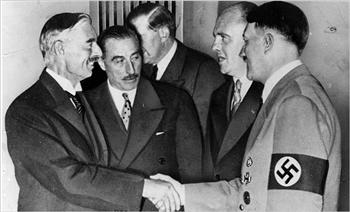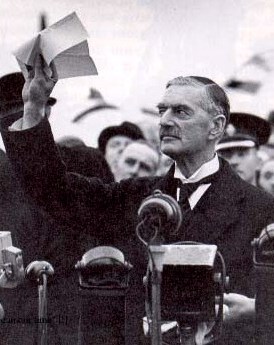Democrat May 2002 (Number 62)

Munich again
Brian Denny and John Boyd
Prior to the Second World War, France and the USSR
had Treaties with Czechoslovakia which guaranteed Czech independence.
This was behind the threat to war from Nazi Germany.
The British Prime Minister had a meeting with German
Chancellor Hitler to dissuade him from war. With the French Premier
Edouard Daladier, Chamberlain tried to recommend the Czech government
to surrender all districts containing more than 50% Germans which
were in the borderlands of Czechoslovakia with Germany.
This was rejected by Germany and Chamberlain had another
meeting with Hitler who then demanded a much larger zone covering
the Sudatenland. France and Britain then mobilised and recommended
Czechoslovakia did the same.
Another meeting
Mussolini, fascist dictator of Italy, proposed another
conference at which Mussolini, Hitler, Chamberlain and Daladier agreed
Germany should occupy the Sudatenland. Chamberlain and Hitler also
signed a declaration ruling out war between Britain and Germany. This
was the infamous agreement which Chamberlain declared was "peace in
our time". Winston Churchill denounced the agreement.
The Czech government was not party to the agreement
and the Czech Ambassador to Britain, Jan Masaryk, said: "If you have
sacrificed my nation to save the peace of the world, I will be the
first to applaud you. But if not, gentlemen, God help your souls."
Munich Agreement
The German army marched into Sudatenland on 1 October
1938. The appeasement was short lived as the Munich agreement was
torn up when Germany occupied the rest of Czechoslovakia five months
later on 1 March 1939. Germany then occupied Poland and Britain declared
war on Germany and the second world war was underway.
After the war the Potsdam conference of the Allies,
the USA, USSR and Britain ordered the resettlement of 11 million Germans
from Czechoslovakia, Hungary and Poland. The Czech government in turn
agreed 142 Decrees named after President Benes.
Decrees
Not a single one of these 142 Decrees is about the
transfer of people. About 10% of the Benes Decrees concerned the confiscation
of property belonging to wartime nazi traitors and collaborators accused
of treason. Almost every decree explicitly stated that the sanctions
did not apply to anti-fascists and some 250,000 German anti-fascists
remained Czech citizens after the transfer.
A dispute and objections to the transfer and Decrees
rumbled on until 1997 when an agreement between Germany and the Czech
Republic was meant to have buried the dispute about the Benes Decrees,
but it has resurfaced as chauvinist rhetoric has heated up in Austria,
Germany and Hungary.
Declaration
EU Commissioner for Enlargement, Gunter Verheugen,
on a visit to Prague, together with the Czech Prime Minister, Milos
Zeman, formally announced on 11 April this year that the disputed
Benes Decrees of 1945 were no longer legally valid.
In a joint declaration they asserted that, "Recently
there has been much public discussion on some of the Czechoslovak
Presidential Decrees of 1945, and on some of the ensuing Czechoslovak
legislation of the immediate post-war period ... but they belong to
history ... (they) no longer produce legal effects ... We are aware
that within the scope of the application" to join the EU, "... discrimination
on grounds of nationality is prohibited ... The Czech authorities
are conducting a review of their legislation ... to put it in line
with the EU
The declaration was denounced by Austrian MEP, Daniela
Rashchhofer who said it was untrue to say the Decrees were no longer
valid as they are still present in Czech laws. She accused Commissioner
Verheugen and Premier Zeman of "arrogance" and the Commission of "political
opportunism".
European Parliament
Speaking before the Foreign Affairs Committee of
the European Parliament, Verheugen said the Decrees will not develop
"new" legal effects but if they do "they will have to be repealed".
Most MEPs called for them to be repealed. The Commissioner said "this
wound" would be healed before enlargement while ensuring "not to fuel
the electoral campaign in the Czech Republic" in the run up to the
14/15 June General Election.
Also in April the Czech parliament reiterated that
Germans and Hungarians nazi collaborators removed from the country
had no chance of regaining property or citizenship.
Revenchism
German revenchism has reared its head again this
May when right wing opposition candidate Edmund Stoiber addressed
80,000 Sudatenland Germans in Bavaria to demand the abolition of the
legal basis of the Czech Republic. Mr Soiber told the right wing group
that the Benes Decrees, drawn up by the liberated Czech state after
the end of the World War, breached European Union membership criteria.
Right wing Austrian and German parties, including
Mr Stoibers conservative Christian Social Union, claim that the expulsions
were carried out under the so-called Benes Decrees which formed the
legal basis of the Czech Republic.
"Why are Czech politicians unable to recognise their
own guilt, to name it and to distance themselves from it?" the Bavarian
premier asked the packed annual right wing meeting. However, Mr Stoiber,
whose wife was herself expelled, said he would work to see the Benes
Decrees overturned if he became Chancellor of Germany.
German Interior Minister
Over the weekend of 18 May the German Interior Minister
Otto Schily stoked the revenchist flames further by calling outright
for the abolition of the Decrees.
During the following week, Czech Premier Zeman took
part in high level meetings with Commission President Romano Prodi,
Commissioner Verheugen, High Representative for CFSP Javier Solana
and Nato General Secretary Lord Robertson. After this meeting Prodi
said in what amounts to a threat: "The European Union has been successful
because we have not looked backwards, because it was founded on a
sense of pardon."
The Czech Republic is now a member of Nato and over
the past year has virtually been ordered by Lord Robertson to purchase
large quantities of new military equipment. German transnational corporations
now own much of Czech industry and the media.
On 23 May the Commission made another appeal for calm
to protagonists over the Benes Decrees to avoid endangering the process
for Czech entry to the EU.
Same big states
Shameful demands for the effective return of Sudatenland
to Hitler's fifth column is a further example of how the power politics
of the EU represents the rule of the strong big states over the weak
and small states and their peoples.
It so happens the four big states were the same in
1938 as those which dominate the EU today - Germany, Britain, France
and Italy!